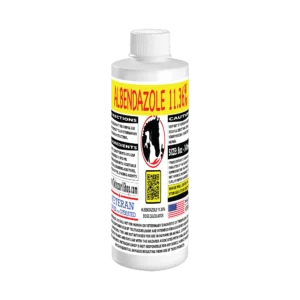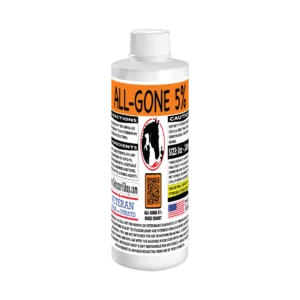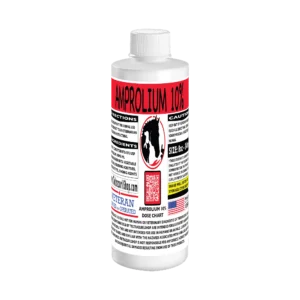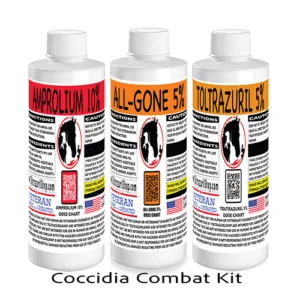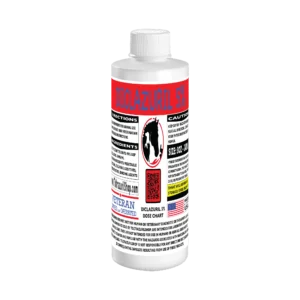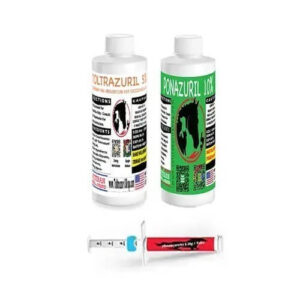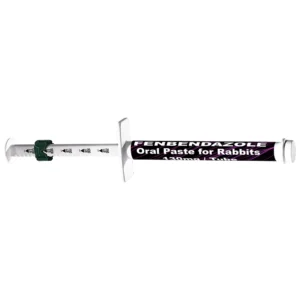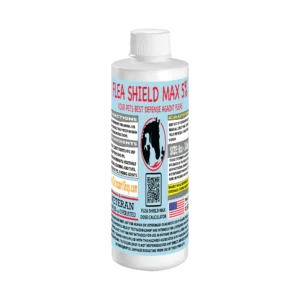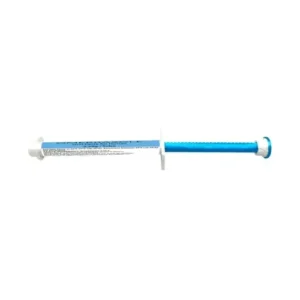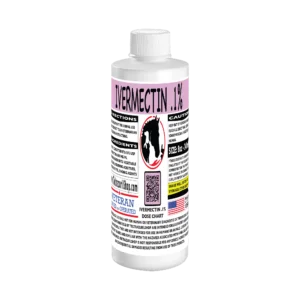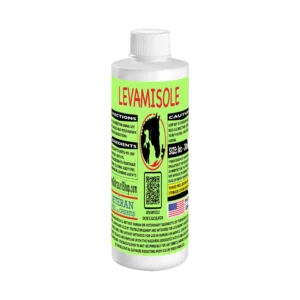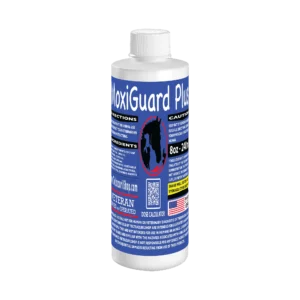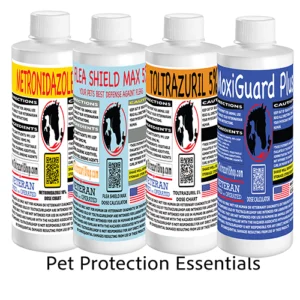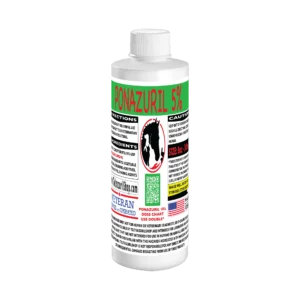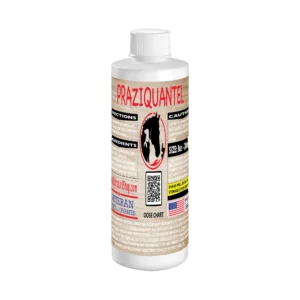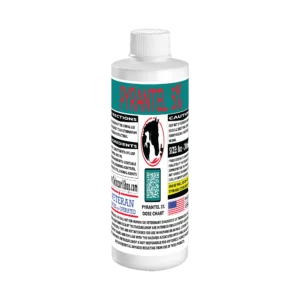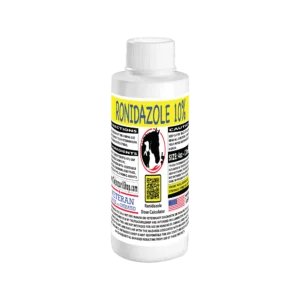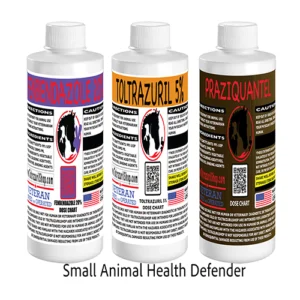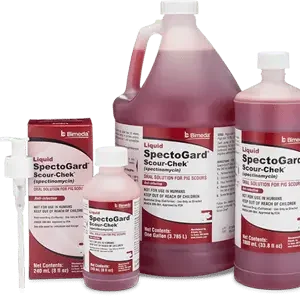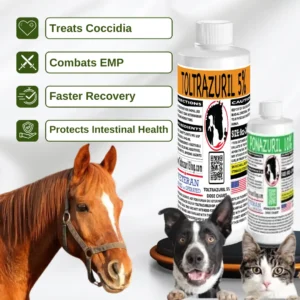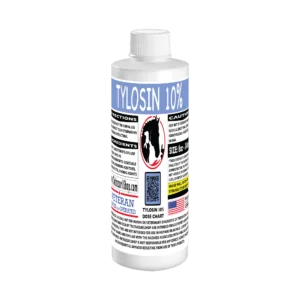-
Animal Products
Albendazole 11.36% Liquid Solution
$9.95 – $219.95 Select options This product has multiple variants. The options may be chosen on the product pageRated 0 out of 5 -
Animal Products
All-Gone 5% Oral Suspension for Pets
$19.95 – $349.95 Select options This product has multiple variants. The options may be chosen on the product pageRated 0 out of 5 -
Animal Products
Amprolium 10% Liquid Solution
$5.95 – $54.95 Select options This product has multiple variants. The options may be chosen on the product pageRated 0 out of 5 -
De-Wormers
Blackout EPM & Coccidia Solution: Fast-Acting Treatment for Coccidiosis and EPM Symptoms
Rated 0 out of 5$119.99Original price was: $119.99.$69.95Current price is: $69.95. Add to cart -
Animal Products
Coccidia Combat Kit
Rated 0 out of 5$99.99Original price was: $99.99.$59.95Current price is: $59.95. Add to cart -
Animal Products
Diclazuril 5% Liquid Solution
$19.95 – $29.95 Select options This product has multiple variants. The options may be chosen on the product pageRated 0 out of 5 -
Animal Products
EPM & Ulcer Eliminator Bundle for Horses
Rated 0 out of 5$269.95Original price was: $269.95.$199.95Current price is: $199.95. Add to cart -
Animal Products
Fen Ben Pro Liquid Dewormer
$14.95 – $409.95 Select options This product has multiple variants. The options may be chosen on the product pageRated 0 out of 5 -
Animal Products
Fenbendazole Liquid Dewormer
$14.95 – $409.95 Select options This product has multiple variants. The options may be chosen on the product pageRated 0 out of 5 -
Animal Products
Fenbendazole Paste | Best Vet-Approved Parasite Protection | 130mg / Tube
Rated 0 out of 5$9.95Original price was: $9.95.$6.95Current price is: $6.95. Add to cart -
Animal Products
Flea Shield Max Flea & Tick Solution
$19.95 – $199.95 Select options This product has multiple variants. The options may be chosen on the product pageRated 0 out of 5 -
Animal Products
Horse Ulcer Treatment | 2.28g Paste Tube
$0.00 – $599.95 Select options This product has multiple variants. The options may be chosen on the product pageRated 0 out of 5 -
Animal Products
Ivermectin Liquid Solution
$6.95 – $129.95 Select options This product has multiple variants. The options may be chosen on the product pageRated 0 out of 5 -
Animal Products
Levamisole 10% Liquid Solution
$12.95 – $249.95 Select options This product has multiple variants. The options may be chosen on the product pageRated 0 out of 5 -
Animal Products
Max EPM Bundle for Horses – Toltrazuril Shop
Rated 0 out of 5$169.99Original price was: $169.99.$99.95Current price is: $99.95. Add to cart -
Animal Products
Metronidazole 10% Liquid Solution
$24.95 – $399.95 Select options This product has multiple variants. The options may be chosen on the product pageRated 0 out of 5 -
Animal Products
MoxiGuard Plus – Moxydectin / Pyrantel / Sarolaner Solution
$39.95 – $199.95 Select options This product has multiple variants. The options may be chosen on the product pageRated 0 out of 5 -
Animal Products
Nitenpyram Flea Shield Max Flea & Tick Solution
$19.95 – $199.95 Select options This product has multiple variants. The options may be chosen on the product pageRated 0 out of 5 -
Animal Products
Omeprazole Paste for Horse Ulcer Treatment | 2.28g Paste Tube
$0.00 – $599.95 Select options This product has multiple variants. The options may be chosen on the product pageRated 0 out of 5 -
Animal Products
Pet Protection Essentials
Rated 0 out of 5$319.99Original price was: $319.99.$189.95Current price is: $189.95. Add to cart -
Animal Products
Ponazuril Liquid Solution
$19.95 – $499.95 Select options This product has multiple variants. The options may be chosen on the product pageRated 0 out of 5 -
Cat Dewormer
Praziquantel Liquid Solution
$22.95 – $39.95 Select options This product has multiple variants. The options may be chosen on the product pageRated 0 out of 5 -
De-Wormers
Pyrantel 5% Liquid Solution
$12.95 – $159.95 Select options This product has multiple variants. The options may be chosen on the product pageRated 0 out of 5 -
Animal Products
Ronidazole 10% Liquid Solution
Rated 0 out of 5$63.99Original price was: $63.99.$29.95Current price is: $29.95. Select options This product has multiple variants. The options may be chosen on the product page -
Animal Products
Small Animal Coccidia & Wormer Bundle
Rated 0 out of 5$199.95Original price was: $199.95.$79.95Current price is: $79.95. Add to cart -
Animal Products
Small Animal Coccidia & Wormer Bundle 6 Pack Rotation
Rated 0 out of 5$149.99Original price was: $149.99.$89.95Current price is: $89.95. Add to cart -
Animal Products
Small Animal Coccidia & Wormer Bundle 8oz Bottles
Rated 0 out of 5$234.99Original price was: $234.99.$139.95Current price is: $139.95. Add to cart -
Animal Products
Small Animal Health Defender
Rated 0 out of 5$189.99Original price was: $189.99.$109.95Current price is: $109.95. Add to cart -
Cattle
Spectinomycin 5% Liquid Solution – Effective Antibiotic for Livestock and Poultry Health
$19.95 – $59.99 Select options This product has multiple variants. The options may be chosen on the product pageRated 0 out of 5 -
Animal Products
Toltrazuril Liquid Solution
$4.95 – $999.95 Select options This product has multiple variants. The options may be chosen on the product pageRated 0 out of 5 -
Animal Products
Tylosin 10% Liquid Solution
$15.96 – $99.95 Select options This product has multiple variants. The options may be chosen on the product pageRated 0 out of 5 -
Animal Products
Ultimate Wormer Rotation Pack – 4oz Bottle of Each
Rated 0 out of 5$149.95Original price was: $149.95.$79.95Current price is: $79.95. Add to cart
Coccidia – Your Trusted Source for Animal Health Solutions
At Coccidia, we are dedicated to providing premium-quality treatments for parasitic infections and overall animal health management. Whether you are caring for livestock, horses, poultry, or pets, we offer a comprehensive range of solutions to combat coccidia, worms, and other parasites effectively.
Backed by the expertise of our parent company, Toltrazuril Shop, a trusted leader in animal health solutions, we bring you scientifically formulated treatments designed for optimal results. Our mission is to ensure that animals receive safe, reliable, and veterinarian-approved treatments to maintain their well-being.
Why Choose Coccidia?
- Expertise & Trust: Our parent website, Toltrazuril Shop, has been a leader in providing reliable animal health solutions for years.
- Comprehensive Product Range: From coccidiosis treatments to dewormers and flea & tick control, we have everything your animals need to stay healthy.
- Vet-Approved Solutions: We provide high-quality, veterinarian-recommended medications to ensure safety and effectiveness.
- Affordable & Accessible: We believe in making premium animal healthcare solutions available at competitive prices.
- Fast Shipping & Reliable Customer Support: Our team is committed to ensuring a seamless shopping experience, providing expert guidance whenever needed.
Our Product Categories
Coccidiosis Treatments
Coccidiosis is a common but serious parasitic disease affecting animals, particularly poultry, cattle, and small pets. We offer specialized Toltrazuril-based solutions, as well as other effective treatments such as Amprolium, Ponazuril, and Diclazuril to help eliminate coccidia infections quickly and efficiently.
Dewormers & Parasite Control
Protect your animals from harmful worms and parasites with our range of deworming solutions, including:
- Fenbendazole Liquid Dewormer
- Praziquantel Liquid Dewormer
- Pyrantel 5% Liquid Solution
- Ronidazole 10% Liquid Solution
Flea, Tick & Mite Solutions
Parasites such as fleas and ticks can cause irritation and diseases in animals. Our Flea Shield Max and Nitenpyram Flea Solutions offer fast-acting relief and long-term prevention.
Ulcer & Gut Health Treatments
Support your horses and pets with essential ulcer treatments like Omeprazole Paste and EPM & Ulcer Eliminator Bundles designed for optimal digestive health.
Animal Health & Wellness Bundles
For comprehensive health management, we offer specially curated bundles such as:
- Coccidia & Wormer Rotation Packs
- Small Animal Health Defender Kits
- Pet Protection Essentials
Featured Products
- Toltrazuril Liquid Solution – The gold standard for treating coccidiosis in various animals. Available in multiple sizes to suit your needs.
- Coccidia Combat Kit – A powerful combination of treatments designed for maximum parasite elimination.
- Blackout EPM & Coccidia Solution – Fast-acting treatment for horses suffering from coccidiosis and EPM symptoms.
Explore our full range of products to find the perfect solution for your animals’ needs.
Coccidiosis & Its Impact on Animals
Coccidiosis is a highly contagious parasitic infection caused by protozoa of the genus Eimeria. It primarily affects young animals and can lead to severe symptoms such as diarrhea, dehydration, weight loss, and even death if left untreated. Commonly affected species include:
- Poultry (chickens, turkeys, ducks)
- Livestock (cattle, sheep, goats)
- Horses
- Small pets (rabbits, guinea pigs, cats, and dogs)
At Coccidia, we provide effective coccidiostats and anticoccidial treatments to help manage and prevent outbreaks in animal populations.
How to Use Our Products Safely
- Always follow the dosage instructions provided on the product label or consult with a veterinarian for guidance.
- Ensure proper hygiene and sanitation in animal housing areas to prevent reinfection.
- Implement preventative treatments regularly, especially for young and immunocompromised animals.
- Store medications in a cool, dry place away from direct sunlight.
For more detailed usage guidelines, visit our Product Pages or contact our Customer Support Team.
Shop with Confidence
- 100% Secure Checkout – Your payment details are encrypted for safe transactions.
- Fast & Reliable Shipping – We ship across the U.S. with quick turnaround times.
- Satisfaction Guaranteed – We stand by our products and offer reliable support.
Start shopping today and protect your animals from harmful parasites with Coccidia’s trusted solutions!
